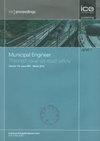Planning cities for pandemics: a review of urban and transport planning lessons from COVID-19
IF 0.8
4区 工程技术
Q4 ENGINEERING, CIVIL
Proceedings of the Institution of Civil Engineers-Municipal Engineer
Pub Date : 2023-03-30
DOI:10.1680/jmuen.22.00030
引用次数: 0
Abstract
For the past years, the world has been facing one of the worst pandemics of modern times. The COVID-19 outbreak joined a long list of infectious diseases that turned pandemic, and it will most likely leave scars and change how we live, plan, and manage the urban space and its infrastructures. Many fields of science were called into action to mitigate the impacts of this pandemic, including spatial and transport planning. Given the large number of articles recently published in these research areas, it is time to carry out an overview of the knowledge produced, synthesising, systematising, and critically analysing it. This article aims to review how the urban layout, accessibility and mobility influence the spread of a virus in an urban environment and what solutions exist or have been proposed to create a more effective and less intrusive response to pandemics. This review is split into two avenues of research: spatial planning and transport planning, including the direct and indirect impact on the environment and sustainability.应对大流行的城市规划:回顾2019冠状病毒病的城市和交通规划经验
在过去几年中,世界一直面临着现代最严重的流行病之一。2019冠状病毒病的爆发加入了一长串变成大流行的传染病的行列,它很可能会留下伤疤,并改变我们生活、规划和管理城市空间及其基础设施的方式。许多科学领域被要求采取行动,以减轻这一流行病的影响,包括空间和运输规划。鉴于最近在这些研究领域发表的大量文章,是时候对所产生的知识进行概述、综合、系统化和批判性分析了。本文旨在回顾城市布局、可达性和流动性如何影响病毒在城市环境中的传播,以及现有或已提出的解决方案,以创建更有效、侵入性更小的流行病应对措施。本文分为空间规划和交通规划两大研究方向,包括对环境和可持续性的直接和间接影响。
本文章由计算机程序翻译,如有差异,请以英文原文为准。
求助全文
约1分钟内获得全文
求助全文
来源期刊
CiteScore
3.70
自引率
0.00%
发文量
15
审稿时长
>12 weeks
期刊介绍:
Municipal Engineer publishes international peer reviewed research, best practice, case study and project papers reports. The journal proudly enjoys an international readership and actively encourages international Panel members and authors. The journal covers the effect of civil engineering on local community such as technical issues, political interface and community participation, the sustainability agenda, cultural context, and the key dimensions of procurement, management and finance. This also includes public services, utilities, and transport. Research needs to be transferable and of interest to a wide international audience. Please ensure that municipal aspects are considered in all submissions. We are happy to consider research papers/reviews/briefing articles.

 求助内容:
求助内容: 应助结果提醒方式:
应助结果提醒方式:


